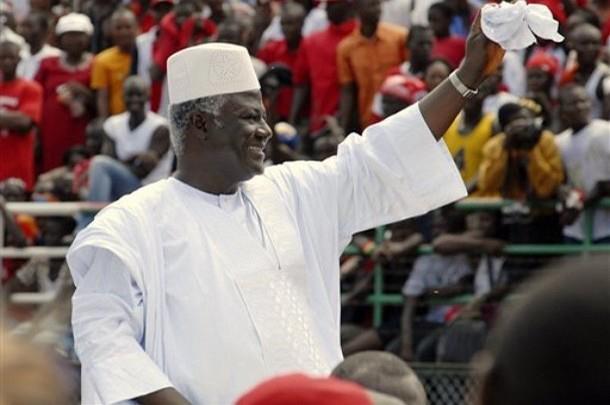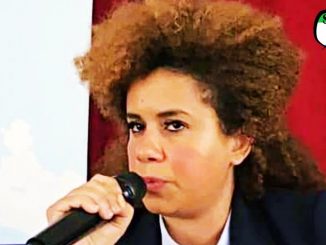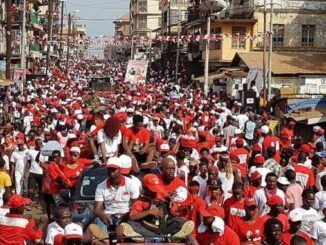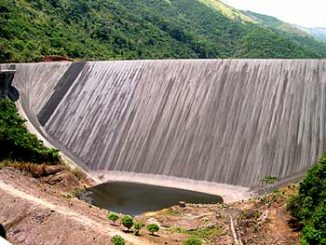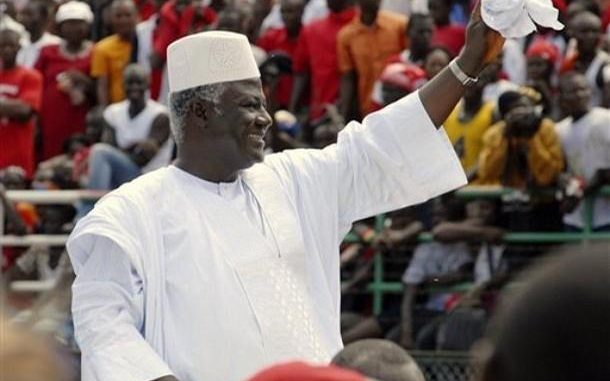
John Baimba Sesay- CHINA
On the invitation of the Communist Party of China (CPC), Secretary-General for Sierra Leone’s governing All People’s Congress Ambassador Osman Yansaneh arrived in Beijing, on 18th September, 2016, with a five man delegation.
The visit was amongst others, aimed at strengthening the ties of friendship and cooperation between the two governing parties. The two parties have had long standing ties of cooperation since the days of Chairman Mao Zedong and Siaka Stevens of China and Sierra Leone respectively.
Since the early 1970s, both countries have also enjoyed strong and uninterrupted friendship and political pundits believe it is as a result of the special relations between the two parties. The ties of friendship between the two republics in fact diminished during the post Siaka Stevens era more so following the brutal overthrew of the APC by power-hungry military boys, under the NPRC.
The return to office in 2007, of the APC under the leadership of His Excellency the President Dr. Ernest Bai Koroma saw a swift reappearance of the exceptional relationship between the two nations. And given these ties, both parties have continued to have high level exchange visits in the last few years.
Prior to the departure on the 23rd September of the party secretary and delegation for Sierra Leone, I caught up with him to talk on a range of issues, not least, the party’s match towards having a flag-bearer, factors it shall be looking at, in securing an acceptable candidate and above all, the dazzling and immaculate role the current Chairman and Leader of the party, Dr. Ernest Bai Koroma has played in building the party over the years.
First, I asked how different his recent visit to China, compared to one in 2013 was:
OFY: In 2013, we didn’t zero in on party to party politics. It was government, economic relationship, cultural and social linkages. But now, we moved towards party-to-party relationship. China has enabled the APC to leave legacies in terms of infrastructure, people-to-people contact. But then, the party constitutes the deciding factors in terms of the policies towards other political parties and governments.
The APC has consistently established a working relationship with the Chinese Communist Party. In fact the Sierra Leone China Friendship society and the China House were initiatives of the APC. The China House is now controlled by a former SLPP minister who is ideologically unsympathetic to the CPC and is only interested in renting the building for personal gains.
On another note, during our visit to Sichuan province, we requested for a partnership between that province and another province in Sierra Leone. The deputy secretary general of the CPC in the province agreed in principle. Our Ambassador here in China is expected to make a follow up on the issue. The cooperation will encompass agriculture, road construction and education for a start. Generally, we have decided that the time has come for some physical, positive manifestation of this relationship between the two parties.
John: What are these physical manifestations?
OFY: We are planning to construct a seven storey APC/CPC building. The Chinese had initiated action. When the Vice Chairman of the National Committee of the Chinese People’s Political Consultative Conference visited Sierra Leone earlier this year, he made a donation. We said we were to keep that as seed money as their own contribution towards the start of that project. In principle they agreed, but then we told them during this our visit we would particularly make a specific request and that request was positively responded to by the Minister and Deputy Minister we saw. The Focal Person on the part of the CPC would be the Vice Minister in charge of the International Department of the CPC and then I suggested the Ambassador here as our own Focal Person. Essentially we have given them what the cost of the entire project would be.
John: In 2013, you spoke of the challenges the party’s branches in the Diaspora were having. Recently, you were abroad, conducting meetings and conventions. How has this helped in positioning these branches given their respective contributions to the growth of the party?
OFY: The Diasporans are positively responding by increasing their membership.
Our main source of income is from registration and contributions made by members. The Diaspora has responded positively in that direction and we are happy. This time round, we went round and got only those who are paid up members. During the last visits, we had to establish interim executives but this time round, substantive executives were put in place by members of the party. They all realized that this is a period the APC needed unity. And through consultation and a process of selection we were able to put in place substantive executives.
John: The National Youth League were to conduct their annual conference in October but had to be postponed to November. What reasons are responsible for this?
OFY: It was not deliberate. The decision was to hold the elections in Port Loko where we have the Bai Bureh Hall which should serve as the venue for the conference. But it turned out that the contractor for the refurbishment of the hall would not be able to complete before the 21st of October, 2016, which was the scheduled date for the youth conference. It has now been shifted a month later.
John: There appears to be some level of tensions between and amongst supporters of those aspiring for the presidency of the League. Isn’t that worrying?
OFY: The APC believes in democracy, people have a right to their opinion and these opinions would move into some concrete arrangements where we would sit together through consultations and where it is necessary to hold an election, we would hold an election. Where selection is necessary we would do it that way.
John: When is the party going for its National Delegates Conference?
OFY: We had a resolution in 2013 specifically stating that our National Delegates Conference will take place within 12 months to elections. February, 2017 will be what that timeframe is.
John: And will the party be having a flag-bearer that period?
OFY: Definitely that is the time we will decide who our flag-bearer would be!
John: You said recently, that only a “blue-blooded APC” would lead the party to elections. What does that mean?
OFY: It would be suicidal to give the leadership of our party to a new member; somebody who just comes to school today, tomorrow he wants to be a Senior Prefect of the school. No, he has to go through some learning process. That is why we are saying only a blue-blooded APC could lead the party to elections.
John: Who then is a blue-blooded APC?
OFY: Somebody who has gone through the rigors of the party, held responsible positions within the party structure, and has served the party diligently. These are the factors we look for.
We also mean somebody who is loyal to the party and has deep institutional knowledge of the party and its people. We cannot afford to choose a weak and untested individual. The person has to be battle tested. We in the APC know people who were on the margins when we most needed their support in the trying days of the struggle to savage our party from the morass in which it had sunk after the NPRC coup.
We know that an APC candidate would be the next president of Sierra Leone. We chose the best for Sierra Leone in President Koroma and we cannot afford to fall short of another Ernest Bai Koroma or close to him.
John: People implicitly or explicitly continue to make known their desire to lead the party to elections. What is the party’s position on this?
OFY: We are not aware of those who have come out because the party has a programme and if you are a member of the party, you should operate within that programme. We said we are going to hold a National Delegates Conference. We said we are going to ask people to apply.
When you want position in the APC, within a few months we would make an announcement and say applications are invited. But if you start expressing your opinion, APC is a democratic party, we would not stop you.
John: A likable and popular character has been the current Party Chairman and Leader. In a 2013 interview I had with you, you said there was no desire on the part of the party to remove him as Chairman and Leader even when he shall have retired. Is this still the same today?
OFY: That is still the case because of his popularity and the diligent manner in which he has worked for the party. The rank and file of the party would have loved him to continue to serve as President of the Republic of Sierra Leone but he himself has maintained that at the end of his two terms he would retire. But the party has no term limit, so the views are that the President could still serve as Chairman and Leader and we would get the presidential flag-bearer whose position would be different from that of the Chairman and Leader.
John: Why was the recommendation to the CRC by the party that a serving president should retire after two terms but that after an intervening one five year term he should be allowed to contest if he so desires?
OFY: We believe a former president who has completed his two mandatory terms of five years each should be given a chance to contest again after an intervening five year. Our president did not make this suggestion. It came from supporters and some of us are of the view that such a move protects the right of an individual to serve his country.
John: There was this smooth transition in having the current Vice President as per law. How did the party ensure that smooth process?
OFY: The APC is a disciplined party. It has a way of addressing issues in a non personate manner. We have our rules clearly defined and we play by the rule of law.
Our constitution is part of the laws of Sierra Leone. The constitution that we have mandates us to appoint a presidential candidate who in turn has the mandate to appoint his running mate. They run on the same ticket but the practical reality is that it is the presidential candidate that is voted for. We are able to do it because the APC is a disciplined party. We did not do anything outside the framework of the law.
Nobody had tested our national constitution. People give it the literal translation. And in law we have the literal translation and the purposive translation. The Supreme Court was ceased of this difficulty and they came out and did a purposive analysis and interpreted the constitution impeccably.
So as I said, the APC is a disciplined party and respects the rule of law. We exhausted the remedies provided in our constitution and did not act on emotions. The decision of the Supreme Court was final and we stand by it.
John: The role of an opposition to the sustenance of democracy is crucial. What could you say about the current opposition platform in the country?
OFY: The SLPP has the tendency to cry foul for everything. Even when they were in charge of governance in 2007, they complained that we were rigging the elections. In opposition we were very positive; we supported the government of the SLPP. They would have these fantastic ideas; they throw them in the air and it ends there because they are not genuine.
SLPP is very uncaring; it is the origin of the party, made up of people with elitist thinking and behavior. As far as they are concern, the ordinary people don’t matter. They have no concerns for the ordinary people, but we do have and that is the difference.
Most prominent people would want to come to the APC because they are materialists also. We refused to accept them, because in the first place, in a successful democracy, getting an effective opposition is a sine qua non (absolutely needed) for promoting the democratic governance.
Some prominent SLPP members have made requests to cross over to the APC. We rejected them to enhance the opposition. This is because if they come it would degenerate to a situation like the 70s when most SLPP people left their party came to us and we had a one party system.
John: Close to the end of the second term. What legacies could be pointed at?
OFY: The party under President Koroma has established a change of attitude on the part of the people. A lot of changes have taken place in terms of physical infrastructure; the road networks not only in the city but also in the twelve districts headquarter towns. We have also ensured the provision of additional megawatts from 6 to over 100, added to the fight against corruption, which has been intensified under this regime.
John: Thank you
OFY: Welcome!


